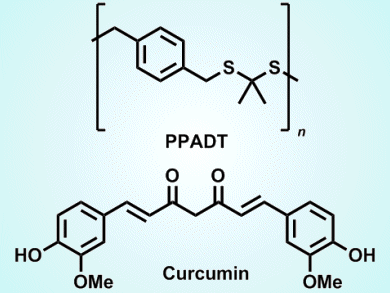Inflammation, a process fostering the development of many diseases such as atherosclerosis and cancer, is characterized by the generation of a lot of reactive oxygen species (ROS) and a decreased intracellular pH. The selective delivery of anti-inflammatory agents in areas under oxidative stress holds therapeutic promise, but it remains a challenge.
Hsing-Wen Sung, National Tsing Hua University, Hsinchu City, Taiwan, and co-workers developed nanoparticles (NPs) that deliver the anti-inflammatory diarylheptanoid curcumin in response to oxidative stress and reduced pH. The researchers synthesized pH-sensitive Cy3-NPCS nanoparticles, namely nanoparticles made of N-palmitoyl chitosan (NPCS) that bears a hydrophobic Cy3 moiety. In these nanoparticles, they encapsulated curcumin and poly-(1,4-phenyleneactone dimethylene thioketal) (PPDAT), a hydrophobic copolymer that is selectively degraded into hydrophilic fragments in response to ROS. In this way, the scientists obtained nanoparticles that efficiently release curcumin in response to ROS and low pH, thereby reducing inflammatory processes.
The new ROS and pH sensitive nanoparticles may, thus, represent a tool to directly deliver therapeutics to the site of inflammation.
- Nanoparticles with Dual Responses to Oxidative Stress and Reduced pH for Drug Release and Anti-inflammatory Applications,
Hsiao-Lan Pu, Wei-Lun Chiang, Barnali Maiti, Zi-Xian Liao, Yi-Cheng Ho, Min Suk Shim, Er-Yuan Chuang, Younan Xia, Hsing-Wen Sung,
ACS Nano 2014, 8, 1213–1221.
DOI: 10.1021/nn4058787




